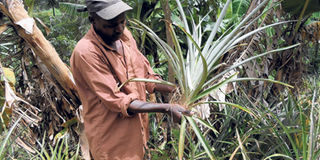Wanted: Certified and quality pineapple suckers

Joshua Ongeni and his son in the family farm in Ikonge, Nyamira. PHOTO | LEOPLOD OBI |
What you need to know:
- Here, we meet Joshua Ongeni, a devout pineapple farmer, who has for more than two decades been growing the tropical fruit.
- The farmer harvests every Wednesday and Sunday over 300 fruits during peak season in February, but his fruits have become smaller. He thus sells each at Sh30 to traders from Chabera and Sondu markets, instead of over Sh50.
- To plant the crop, explains Ongeni, you extract a sucker from the mother crop and remove some of its leaves.
The bus stop at Chabera township in Nyamira County is always abuzz with traders hawking fresh farm produce that include bulb onions, maize, bananas and pineapples.
Of all the produce, however, most of them usually sell pineapples.
The pineapples come mainly from Ikonge, an agricultural hub in the county. Situated about 30 minutes from Chabera in Borabu sub-county, the area has a good climate for production of the fruits, with tens of farmers growing them.
We drive to Ikonge to see for ourselves what makes the area tick when it comes to pineapple farming.
Here, we meet Joshua Ongeni, a devout pineapple farmer, who has for more than two decades been growing the tropical fruit.
Ongeni’s three acres that stretch to the bank of River Sondu-Miriu are dedicated to pineapple farming, though he has planted several gravellia trees (Gravellia robusta).
“The trees act as wind breakers and they also protect the pineapples from strong sun rays during the dry season,” says Ongeni who uses the trees leaves to mulch his farm.
Ongeni gives one an impression of a farmer who is on top of his game, until he opens up.
“I am getting frustrated with pineapple farming because I cannot get quality suckers.”
He first planted the fruit in 1988 after getting suckers from Ministry of Agriculture, which was then promoting the crop in the region.
Since then, Ongeni says he has never bought fresh suckers.
“Over the years, I have been getting suckers from what is on my farm. I normally remove the leaves from a mature plant and let the suckers sprout. It is known as ratooning.”
The method has worked for him for several years but according to the farmer, the crops have surpassed their lifetime, the reason why his yields have dwindled. “Pineapple farming is a major agribusiness in this area but there is no place farmers can get certified suckers.”
HARVESTS
The farmer harvests every Wednesday and Sunday over 300 fruits during peak season in February, but his fruits have become smaller. He thus sells each at Sh30 to traders from Chabera and Sondu markets, instead of over Sh50.
Tito Nyabuto, another pineapple farmer in Ikonge, who has grown the crop for more than 10 years, sometimes buys suckers from fellow farmers but they are still recycled suckers.
Pineapple, which is planted through vegetative propagation, has three sources of seeds. First is the crown, which is the leafy growth on top of the fruit, second slips, described as a shoot arising from the fruit stalks and lastly suckers, which are little plantlets that grow between the leaves of the mature pineapple or from the base of the plant where the roots grow.
To plant the crop, explains Ongeni, you extract a sucker from the mother crop and remove some of its leaves.
“You then plant it in a spacing of four by two feet. It will fruit after 18 months.” A pineapple plant flowers only once, and produces a fruit. It then dies. But before it dies, it produces a sucker.
Michael Ngahu, a field extension service manager at Kakuzi Ltd, says there are few sources of good pineapples suckers in the country.
“We source ours from Del Monte because we do not want to risk growing inferior plants. There are opportunities in the suckers’ production business,” he says as he acknowledges ratooning leads to low yields.
The tropical fruit grows well at average temperature of 25 degree Celsius. Prolonged cold retards growth, delays maturity and causes the fruit to become sour and acidic. The crop requires a pH of between 4 to 6.
The most common pineapple variety grown in the country is the Smooth Leaf Cayenne.





